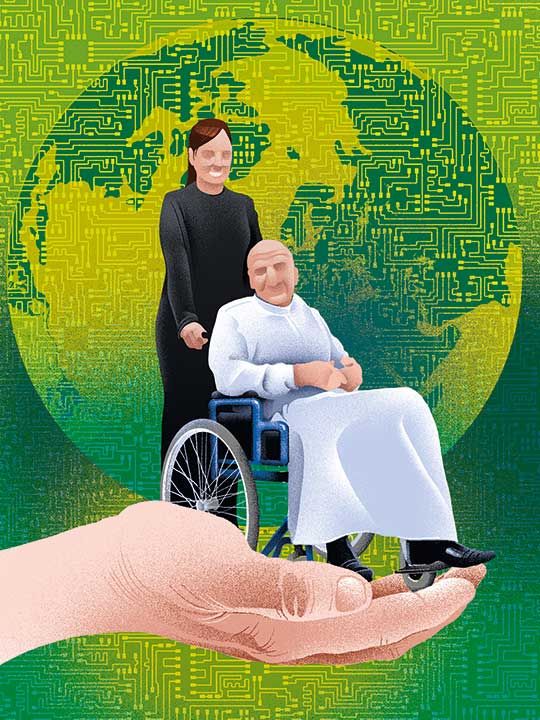We live in an unequal world. Nearly half of the global population live on less than Dh10 a day. Over a third of the population in developing countries is illiterate and have limited access to basic education.
Three out of ten people worldwide lack safe drinking water and 150 million people across the world do not have a roof over their head.
While traditionally it has been mainly governments and non-governmental organizations that have been working to address developmental goals, corporate establishments and individuals have been stepping into the arena to be active contributors in philanthropy.

Philanthropy, literally meaning “love of humanity”, has been in existence from yore but is now showing a rapid rise. This is being led by the accumulation of substantial private wealth – there are an estimated 15 million millionaires and 2,000 billionaires - as well as the emergence of policies and mechanisms to professionalize the sector.
A quarter of a million philanthropic institutions, over half of them set up in this century, manage about $2 trillion of assets and deploy about 10 per cent of it annually. Education and poverty alleviation are the main priorities of most foundations, followed by other goals such as healthcare, disaster assistance and supporting arts and culture.
In the Middle East, charitable giving has always been part of long-standing religious beliefs and traditions, and has seen marked growth in the past few decades led by rapid economic development. In the UAE, the International Humanitarian City hosts a wide selection of UN agencies and non-profit organisations, and 2017 was declared as the “Year of Giving”.
Technology is emerging as a key enabler in helping a wider set of people engage more easily in philanthropy. Goodworld is a digital platform that allows individuals or not-for-profit organizations to raise money directly on social media for any cause, from setting up a village hospital to saving wildlife. Ethiscrowd is an Islamic crowdfunding site that enables investors to help build affordable houses for needy people while providing a healthy return.
Stronger regulations are being put in place internationally to ensure more transparency and rigour for collection and usage of philanthropic funds. Countries like India have enacted a law prescribing a mandatory 2 per cent contribution of net profits of medium and large businesses to be set aside for social development.
The gift of time is often more valuable than the gift of money, especially in a busy world. Volunteering is an enormous social and economic force today. There are an estimated 1 billion volunteers and the work they contribute annually measures up to the equivalent of over 100 million full-time staff, making it the fifth largest workforce globally.
While a majority of volunteering takes place informally, organization-based and formal volunteering is becoming more wide-spread. Many business organizations have in place a corporate volunteering programme that helps the company support the communities they operate in, as well as strengthen employee collaboration.
An impactful corporate volunteering programme is increasingly being seen as a must-have for the altruistically motivated millennial workforce. Emirates NBD’s Exchanger programme enables employees to volunteer for a variety of causes through the year. In 2018, over 1,600 staff contributed over 36,000 hours towards community work.
Skill-based volunteering where people share their specialized talents – such as a consultant helping an agricultural cooperative to better market its products – helps connect employee passion to causes they care about. Salesforce, a software company based in San Francisco that was ranked first in 2018 in Fortune’s 100 best companies to work for, prides on their 1-1-1 model that pledges 1 per cent of equity, 1 per cent of product and 1 per cent of employee time to communities around the world.
Doing well by doing good
Corporates are evolving from doing philanthropy to being socially responsible and to building their businesses centred on creating shared value for both business and society. This focuses on not so much wealth re-distribution as in enlarging the pie itself so that everybody gets a larger share.
Beverage company Pepsico, which relies on the availability of clean water to produce soft drinks, is also working with non-profit organizations to make available safe water access to underserved communities. MasterCard works with companies in Africa to digitalise the payroll of low-wage workers to ensure they are able to save and spend their pay safely.
However, there is emerging criticism that big businesses and wealthy individuals are trying to present on one hand a rosy picture of corporate responsibility while on the other continuing to perpetuate inequalities and unsustainable practices that cause harm to society. A hedge fund that advocates impact investing while also carrying out tax-avoidance strategies may not be an ideal corporate citizen. Addressing these inconsistencies by benefactors will ensure stronger creation of shared value.
Suvo Sarkar is the Senior Executive Vice-President and Group Head - Retail Banking & Wealth Management at Emirates NBD.












